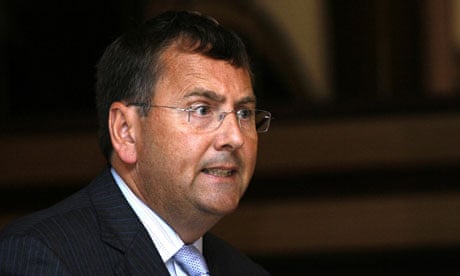Tesco will on Wednesday signal an embarrassing retreat from the US after pouring £1bn into a bid to take on the mighty Wal-Mart in its own backyard.
The UK's biggest retailer will announce it is launching a "strategic review" of its loss-making US chain, Fresh & Easy. Such reviews usually mean a sale or outright closure.
The review has been ordered by Tesco's chief executive, Philip Clarke, who took over from Sir Terry Leahy last year. Tesco had hoped to build Fresh & Easy into a business as big as its core UK chain. The first Fresh & Easy opened amid much fanfare five years ago and there are now about 200 stores in southern California and Nevada.
But Tesco's plans were far more ambitious. Within weeks of the first store opening, in Hemet, east of Los Angeles, Fresh & Easy bosses were voicing ambitions to have 1,000 stores across California and then take Fresh & Easy to the east coast.
The retailer built a vast warehouse, complete with America's biggest expanse of solar panels to help power it, and a food factory next door to make the ready meals that UK shoppers buy by the million but were almost unknown in the US.
The plans came after two years of intensive research which involved Tesco sending senior executives from the UK to live with Californian families, assess they way they shopped and ate, and to build secret test stores.
But their research proved faulty. Almost every aspect of the shops, from their interior decoration to the pack sizes and self-serve tills have been changed. Fresh & Easy also opened as the subprime mortgage crisis and subsequent economic downturn took hold, hitting US consumer confidence and spending power. The chain has also faced opposition from US trade unions.
The business is estimated to have cost Tesco nearly £1bn of investment and accumulated losses. It lost £74m in the most recent six months.
Clarke will confirm the details of the review as he unveils what City analysts believe will be a gloomy trading update for the past three months.
The group is expected to say like-for-like sales, which exclude business from new stores, fell by up to 1% on the same period a year ago. That figure includes the effect of inflation, so the real decline is greater. It compares with a 1.7% increase recorded recently by rival Sainsbury's.
Tesco, which employs nearly 300,000 staff in the UK and operates more than 3,000 outlets, has had a grim 2012. In January, after a poor Christmas last year, Tesco was forced to issue its first warning of falling profits for two decades. Its shares have fallen 19% this year.
Last spring Clarke launched an overhaul of the British business and is pouring £1bn into revamping the stores, sharpening prices and improving products. He is scaling back store openings and said there would be very few new superstores as shoppers increasingly move online for fashion and homewares. Clarke said that "apps are the new high street".
Tesco has problems in other parts of its global operations. Its mainland European stores have been hit by the eurozone crisis while in Korea it is facing a £100m hit to profits as a result of new laws that limit trading hours. China is growing far less rapidly than expected.
One leading City analyst downgraded the firm and urged investors to sell Tesco shares. Caroline Gulliver of Espirito Santo said a survey carried out for the bank made "worrying reading". The survey showed that only 29% of shoppers now choose to make most of their purchases at Tesco, compared with 35% last year. "Rather than seeing improvements, UK consumers perceive that Tesco's offer is becoming less competitive on price and quality," said Gulliver.
A survey published on Tuesday by Kantar Worldpanel showed Tesco's market share has slipped to 30.7% from a peak of nearly 32%. The retailer is losing out to Waitrose at one end of the price scale and to discounters like Aldi at the other. The Aldi chain has 10% more shoppers than a year ago, who are spending 17% more.
